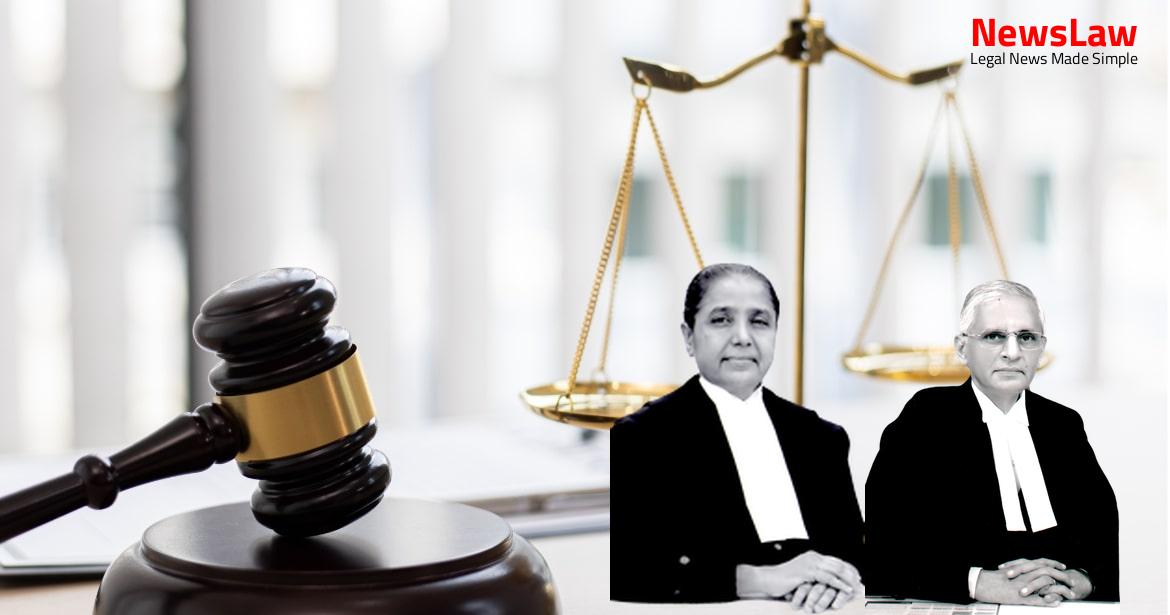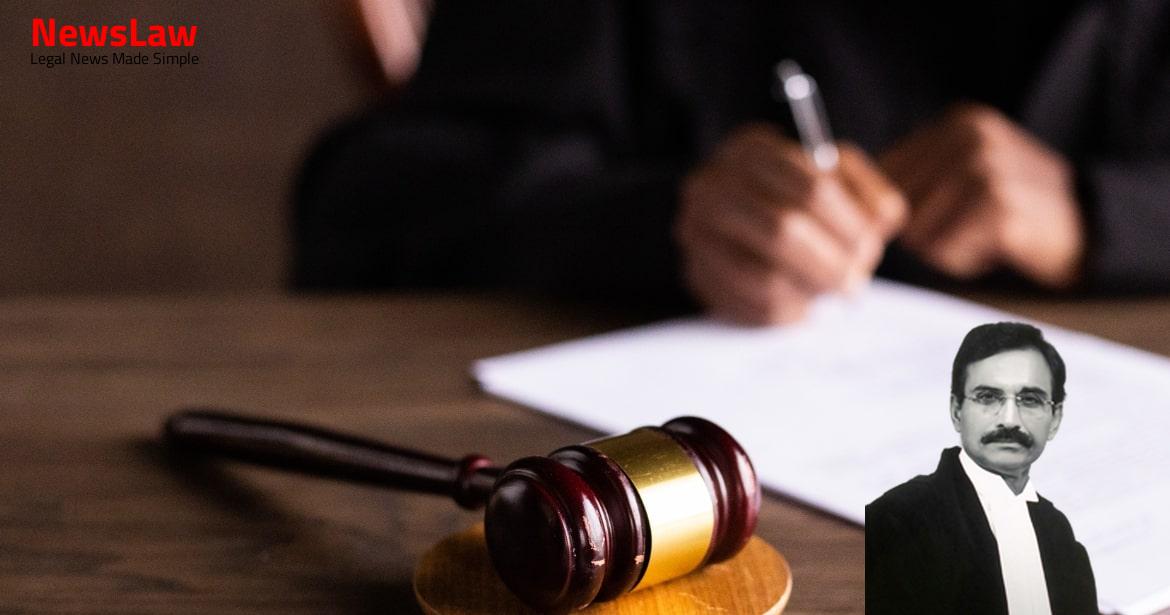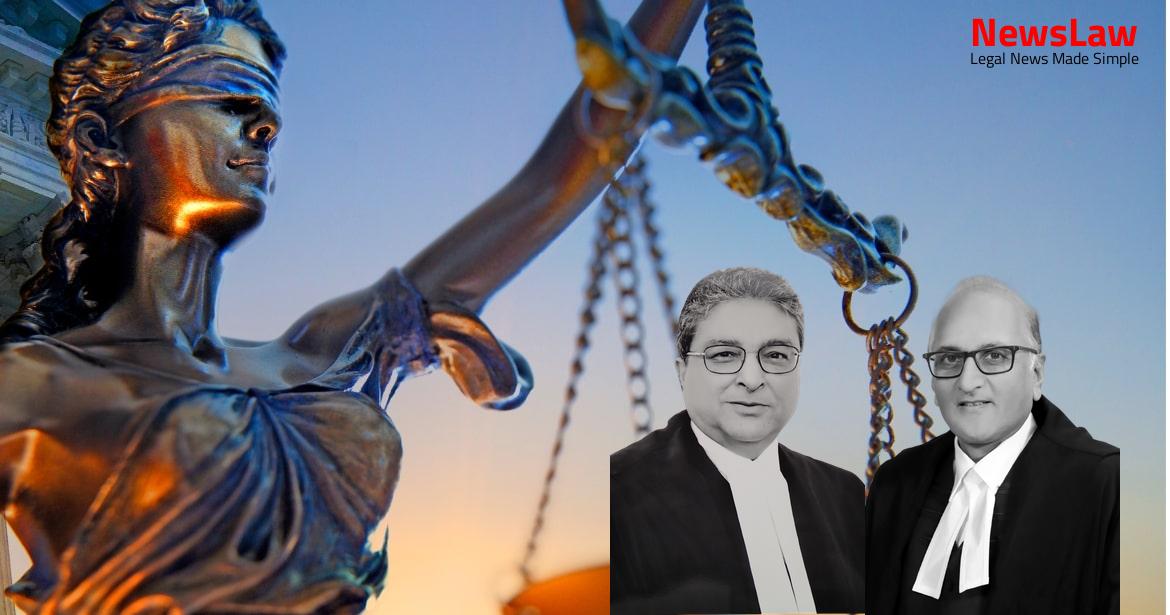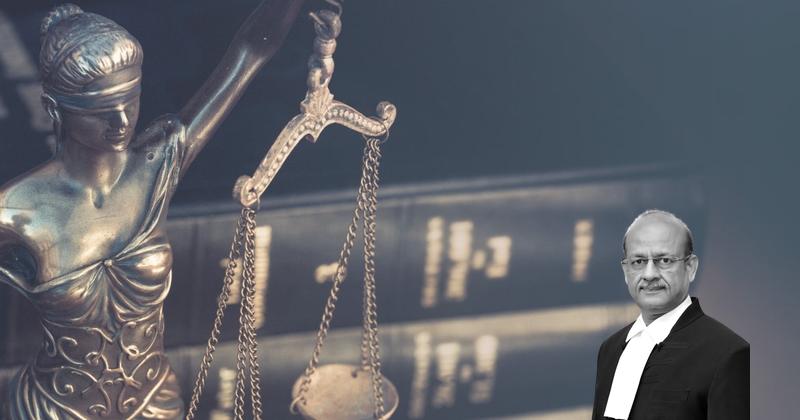In a landmark ruling, the Supreme Court of India has resolved the large gala allotment dispute that arose between the parties involved. The case, which revolved around the entitlement claims and lottery process for Gala No.F-158, saw a significant deliberation on compliance with Daud Committee norms and individual vs. partnership firm eligibility criteria. Stay tuned to discover the outcome of the Supreme Court’s judgment on the matter.
Facts
- The decision to conduct a lottery for the allotment of large galas was challenged by M/s Ramchandra Vitthal Dongre.
- The High Court set aside the order of the Director of Agricultural Marketing and directed APMC to allot the gala in compliance with previous orders.
- The High Court observed that lottery allocation was improper and suggested considering market rates and sealed tenders instead.
- The High Court further directed that only the second respondent was eligible for the large gala allotment.
- The Minister for Co-operation, Marketing, and Textile upheld the lottery process and the allotment to Hande Wavare & Co.
- The High Court appointed a Court Commissioner to suggest norms for gala allotment, which were accepted.
- Ganpat Shinde’s allotment was also a subject of contention and appeals.
- The Daud Committee provided eligibility criteria for gala allotment based on different time frames.
- The High Court directed APMC to allot the gala to Habibullah Farhatullah as he fulfilled all eligibility criteria.
- Challenges and revisions were filed by various parties regarding gala allotment decisions.
- M/s. Ramchandra Vitthal Dongre approached the High Court seeking allotment of a large gala.
- A lottery was conducted by APMC, where only four out of five claimants participated.
- APMC directed respondent No.2, Habibullah Farhatullah, to be allotted Gala No. F-158.
- M/s. Hande Wavare and Company was selected in the lottery for Gala No. F-158.
- The value of Gala No. F-158 was fixed at Rs.28,77,000/- as per Government ready reckoner.
- APMC asked the appellant to return the small gala allotted initially and pay Rs.27,69,500/- for the large gala.
- Dispute arose regarding the allotment of galas/shops leading to multiple petitions in the High Court.
Also Read: High Court Acquittal Case of State of Uttar Pradesh v. Jai Prakash
Issue
- The High Court’s decision to grant entitlement of allotment to the second respondent, despite not booking the gala or paying the booking amount before the cut-off date, is under question.
- The reliance placed solely on the order of Director, Marketing dated 24.09.2002 by the High Court is also a point of contention.
- The consideration of other claimants under the category of ‘marginally fall short of the norms’ and the jurisdiction related to the drawing of the lottery by APMC are crucial aspects being debated.
- The norms laid down by the Justice Daud Committee in 1987-88 regarding the shifting of subsidiary markets of fruits and vegetables from Mumbai to Vashi, Navi Mumbai are central to the issues at hand.
Also Read: Judgment Review: Supreme Court’s Ruling on the Capital Punishment Appeal
Arguments
- Respondent No.2 did not pay the booking amount for the gala and is not entitled for allotment of a large gala.
- APMC could not have considered other claimants under the category of ‘marginally falling short’ if Respondent No.2 was eligible for a large gala.
- Orders passed by the Director of Agricultural Marketing were contrary to norms suggested by the Daud Committee.
- Appellant Ganpat Sabaji Shinde had deposited an amount more than the required norm for large gala allotment.
- Eligibility of M/s Ramchandra Vitthal Dongre partnership firm for a second large gala was not disputed.
- APMC had only one large gala vacant and was conducting a lottery among eligible claimants.
- The order allowing the transfer of booking amount in the name of Respondent No.2 was binding and hence, he was the only eligible claimant for the large gala.
- The High Court should have independently considered the eligibility of Respondent No.2 instead of relying on technical grounds.
- Appellant’s counsel argued that the appellant had requested for Gala No.F-158, but it was not considered by APMC.
- APMC informed the appellant that Gala No.F-158 had been allotted through a lottery system.
- Respondent did not pay any booking amount, so the appellant’s argument was that a large gala could not have been allotted to the respondent.
- The respondent did not participate in the lottery citing an order in his favor from the Director of Agricultural Marketing.
- Board of Directors of APMC decided to conduct a lottery among claimants falling marginally short of norms set by Daud Committee.
- The High Court erred in holding the respondent eligible based on the 2002 order from the Director, according to the appellant’s counsel.
Also Read: Compromise Reached: Reddy Satyanarayana vs Narapureddy Sanyasi Rao
Analysis
- The High Court held that Ganpat Shinde is entitled to claim a large gala as he falls under the category of ‘marginally falls short of the norms’.
- The Director of Agricultural Marketing’s order dated 24.09.2002 allowed transfer of booking amount from one person to another, impacting allotment decisions.
- The High Court erred in solely basing respondent Habibullah Farhatullah’s entitlement on the Director’s order, disregarding the Daud Committee norms.
- The partnership firm M/s Ramchandra Vitthal Dongre is not separately eligible for gala allotment based on individual partner’s credentials.
- The APMC’s records show discrepancies in the amount paid by Ganpat Shinde, raising doubts about his eligibility for a large gala.
- The APMC was directed to allot Gala No.F-158 through a lottery amongst eligible claimants, as decided in a Board meeting resolution.
- The compliance with Daud Committee norms and the individual vs. partnership firm eligibility criteria were central to the litigation outcomes.
- Orders passed by the authorities were not wholly without jurisdiction and not nullities.
- Orders passed by competent court/quasi-judicial authority have the force of law until set aside by a court of competent jurisdiction.
- Article 14 of the Constitution of India is a positive concept and cannot be enforced in a negative manner.
- The respondent, Metadin Agarwal, had obtained a decree for eviction against M. Meenakshi and others in a suit filed before the Civil Judge.
- The said decree was challenged by M. Meenakshi and others before the District Judge, who dismissed the appeal and confirmed the decree passed by the Civil Judge.
- Subsequently, a second appeal was filed before the High Court, which was also dismissed, upholding the decree for eviction.
- The Supreme Court noted that the findings of fact recorded by the courts below regarding the relationship between the parties, the tenancy agreement, and other relevant factors were not shown to be perverse or based on no evidence.
- It was held that mere procedural irregularities or errors in appreciation of evidence would not warrant interference in second appeal unless substantial and grave injustice was established.
- The Supreme Court reiterated that the High Court could not re-appreciate the evidence in a second appeal, especially when concurrent findings of fact were recorded by the lower courts.
- The Court concluded that the challenges raised by M. Meenakshi and others did not persuade them to interfere in the second appeal, and thus the decree of eviction passed against them was upheld.
- The small Gala No.M-821 allotted to the appellant is still vacant
- Instead of lottery method, sealed offers should be invited after fixing market value for more revenue
Decision
- M/s 44 Hande Wavare & Co. should vacate the large Gala No.F-158 at the earliest to attract better offers.
- The amount of Rs.27,69,500/- deposited by the appellant towards the large gala No.F-158 shall be refunded within two weeks of vacating.
- The upset value of large Gala No.F-158 shall be fixed at Rs.55,00,000/- as determined by APMC.
- The eligible claimants like M/s Hande Wavare & Co., Mr. Ganpat Sabaji Shinde, M/s Bhalchandra Chintaman Lele (Mr. Kedar Keshav Lele), and Mr. Ashok Dhondiba Punde should quote their offers in sealed covers for Gala No.F-158.
- The Gala No.F-158 should be allotted to the highest bidder among the eligible claimants.
- APMC shall re-allot the small sized Gala No.M-821 to M/s Hande Wavare & Co. and they should vacate Gala No.F-158 by the end of September, 2019.
- The High Court’s decision regarding the entitlement claims of certain parties is set aside or affirmed accordingly.
- The possession of small Gala No.M-821 shall be restored to M/s Hande Wavare & Co. who must vacate Gala No.F-158 by 30.09.2019.
Case Title: M/S HANDE WAVARE AND CO. Vs. RAMCHANDRA VITTHAL DONGRE
Case Number: C.A. No.-005350-005350 / 2019



